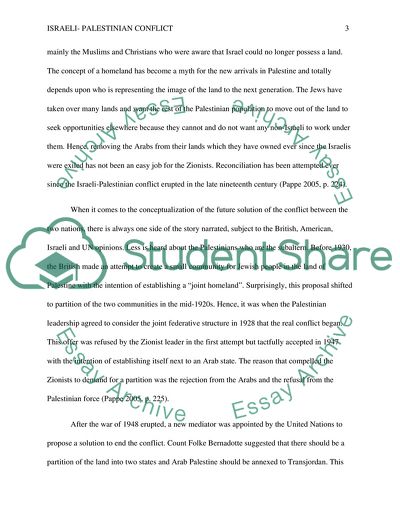Cite this document
(Israeli Zionism vs Palestinian National Movement Essay Example | Topics and Well Written Essays - 3000 words, n.d.)
Israeli Zionism vs Palestinian National Movement Essay Example | Topics and Well Written Essays - 3000 words. https://studentshare.org/military/1768636-the-israeli-palestinian-conflict-has-endured-for-too-long-is-it-because-israeli-zionism-has-incrementally-taken-an-extremist-direction-or-is-it-because-the-palestinian-nationalist-movement-has-proved-to-be-ineffective
Israeli Zionism vs Palestinian National Movement Essay Example | Topics and Well Written Essays - 3000 words. https://studentshare.org/military/1768636-the-israeli-palestinian-conflict-has-endured-for-too-long-is-it-because-israeli-zionism-has-incrementally-taken-an-extremist-direction-or-is-it-because-the-palestinian-nationalist-movement-has-proved-to-be-ineffective
(Israeli Zionism Vs Palestinian National Movement Essay Example | Topics and Well Written Essays - 3000 Words)
Israeli Zionism Vs Palestinian National Movement Essay Example | Topics and Well Written Essays - 3000 Words. https://studentshare.org/military/1768636-the-israeli-palestinian-conflict-has-endured-for-too-long-is-it-because-israeli-zionism-has-incrementally-taken-an-extremist-direction-or-is-it-because-the-palestinian-nationalist-movement-has-proved-to-be-ineffective.
Israeli Zionism Vs Palestinian National Movement Essay Example | Topics and Well Written Essays - 3000 Words. https://studentshare.org/military/1768636-the-israeli-palestinian-conflict-has-endured-for-too-long-is-it-because-israeli-zionism-has-incrementally-taken-an-extremist-direction-or-is-it-because-the-palestinian-nationalist-movement-has-proved-to-be-ineffective.
“Israeli Zionism Vs Palestinian National Movement Essay Example | Topics and Well Written Essays - 3000 Words”. https://studentshare.org/military/1768636-the-israeli-palestinian-conflict-has-endured-for-too-long-is-it-because-israeli-zionism-has-incrementally-taken-an-extremist-direction-or-is-it-because-the-palestinian-nationalist-movement-has-proved-to-be-ineffective.


